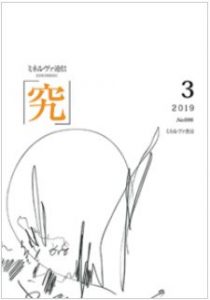Vol. 31 of Prof. Kawai’s Essay Series in Minerva Correspondence: Kiwameru was Published
A new installment in Prof. Toshio Kawai’s essay series, “Kokoro’s Forefront and the Layers of History” was published in the March 2019 issue of Minerva Correspondence: Kiwameru.
The theme of this month’s essay was depression and Kokoro’s layers of history.
Due to advancement in medicine and early intervention, biological factors are widely thought to play an important role in depression. However, the author argues that generational and cultural aspects also have large influences on depression. Contemporary modes of depression are seen as constituting a “new type of depression”, and patients tend to have less of a sense of guilt, which was formerly a key characteristic of the condition. Fifty years ago, it was more common to see only the symptoms of depression but recently bipolar disorder, which causes periods of both depression and abnormally elevated mood, is increasing.
The author discusses these trends from the viewpoint of pre-modern ways of kokoro and kokoro’s layers of history. Modern illnesses related to kokoro arise from internal conflicts, such as self-blaming. One of their characteristics is that they occur within a closed world. As opposed to this, from the viewpoint of kokoro’s layers of history, illness of kokoro pour out of self and go beyond it. In the pre-modern world, illnesses meant a loss of the soul or the invasion of the body by something of a foreign nature. Therefore, in the pre-modern way of thinking, depression can look like a loss of soul, and manic state can look like spiritual possession.
The author proposes that to treat depression today, it may be beneficial to visualize psychotherapy as a way of retrieving a lost soul.

The publisher’s website
https://www.minervashobo.co.jp/book/b439651.html
2019/03/13